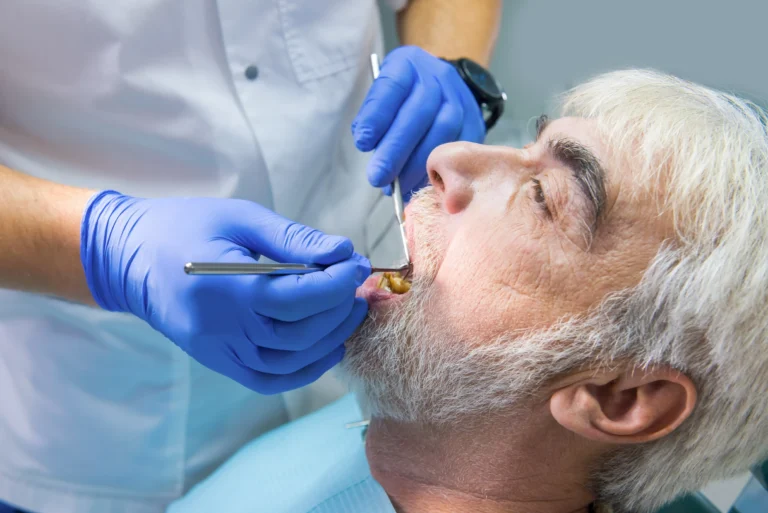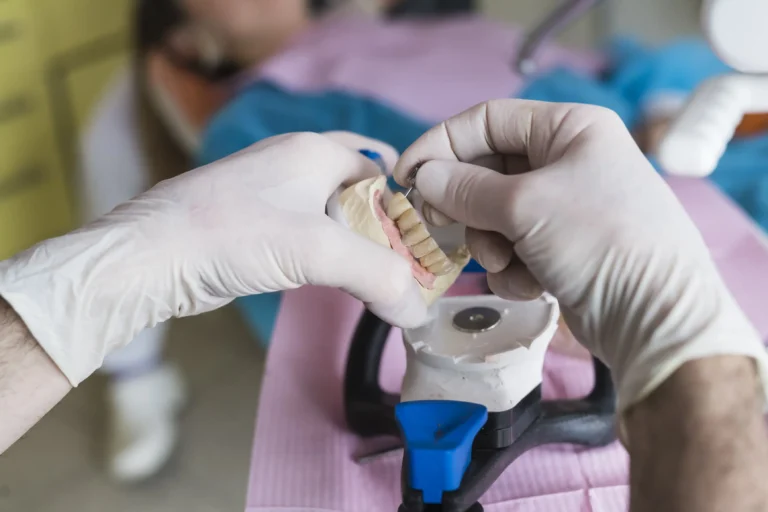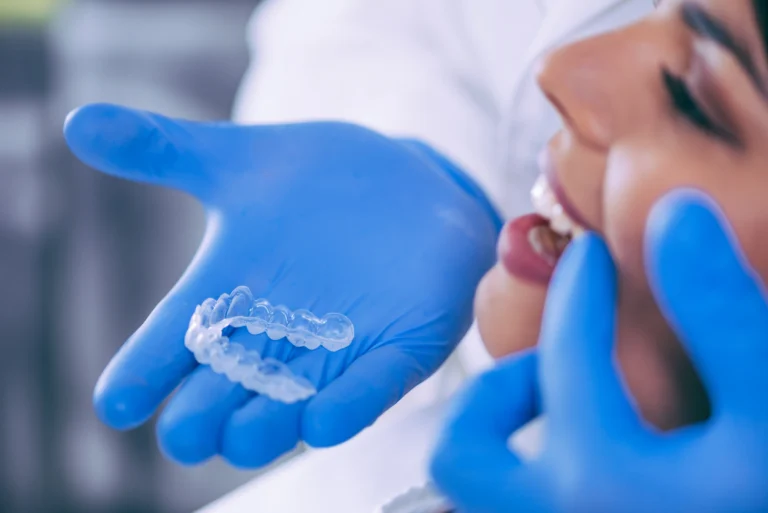Comprehensive Dental Procedures at Dorset Dental in Scarborough, ON

Your Go-To Clinic for All Dental Procedures in Scarborough
Dorset Dental provides a wide range of dental procedures to meet all your oral health needs. From routine cleanings to more complex treatments, our skilled team in Scarborough, ON, is equipped with the latest technology to ensure the best care for your teeth and gums.


Routine Dental Exams and Cleanings
Regular dental exams and cleanings are the cornerston of maintaining oral health. Professional dentists of Dorset Dental use state-of-the-art equipment to clean your teeth thoroughly and check for any signs of dental issues, ensuring early detection and treatment.

Dental fillings and restorations are common procedures to repair teeth damaged by decay or trauma. We offer a variety of filling materials, including tooth-colored options, to restore the functionality and appearance of your teeth.

Crowns and bridges are reliable solutions for restoring or replacing damaged or missing teeth. We offer custom-designed crowns and bridges that match the natural color and shape of your teeth for a seamless look.

Root canal therapy is a vital procedure for treating infected or damaged tooth pulp. Our experienced dentists perform root canals with precision and care, alleviating pain and saving your natural tooth.

Enhance the appearance of your smile with our cosmetic dental procedures, including teeth whitening veneers, and bonding. Our Cosmetic dentistry treatments are designed to improve aesthetics while maintaining the health of your teeth.

When a tooth cannot be saved, extraction may be necessary. Whether it’s due to severe decay, injury, or for orthodontic reasons, our team ensures a safe and as pain-free extraction process as possible.

We believe in the power of preventive dentistry. Our Scarborough dental clinic offers sealants, fluoride treatments, and patient education to help prevent dental diseases and maintain optimal oral health.
Why Choose Dorset Dental for Common Dental Procedures?
Top Notch Dental Care: Dorset Dental prides in providing top-notch dental care in Scarborough, ON using the latest technology and techniques. Our state-of-the-art equipment ensures that every procedure, from routine cleanings to more complex treatments, is performed with the highest precision and care.
Experienced and Compassionate Team: Our dental professionals are not only highly skilled and experienced but also deeply committed to providing compassionate care. We understand that visiting the dentist can be daunting, so we strive to create a comfortable and reassuring environment for all our patients.
Personalized Treatment Plans: We believe in a personalized approach to dental care. Our team takes the time to understand your individual needs and concerns, ensuring that each treatment plan is tailored specifically to you, maximizing effectiveness, and ensuring your comfort.
Comprehensive Dental Services: From preventive care to cosmetic dentistry and restorative dentistry, Dorset Dental offers a wide range of services under one roof. This comprehensive approach saves you time and ensures continuity of care.
Commitment to Patient Education: We are strong advocates for patient education. Our team ensures that you are fully informed about your dental health and treatment options, empowering you to make the best decisions for your oral health.
Focus on Preventive Dentistry: We emphasize the importance of preventive care to maintain your oral health. Regular check-ups, cleanings, and educational resources are part of our commitment to prevent dental issues before they develop.
Gentle Care for Anxiety-Free Visits: Understanding that dental anxiety is common, we practice gentle dentistry and offer solutions to help alleviate fear and stress. Our goal is to make your dental experience as comfortable and anxiety-free as possible.
Convenient Location and Scheduling: Located in Scarborough, ON, Dorset Dental is easily accessible. We offer flexible scheduling options, including early morning and evening appointments, to accommodate your busy lifestyle.
Dedicated to Long-Term Relationships: We strive to build long-term relationships with our patients. By understanding your dental history and goals, we provide consistent, customized care tailored to your evolving needs over the years.
Schedule Your Dental Procedure Today
Ready to take the next step in your oral health journey? Contact Dorset Dental in Scarborough, ON, to schedule an appointment for any of our dental procedures. Our team is committed to providing you with the highest quality of dental care.

FAQs
The best Scarborough dental clinic called Dorset Dental which offers a wide range of dental procedures, including routine cleanings and exams, fillings, root canals, tooth extractions, crowns and bridges, cosmetic procedures like teeth whitening and veneers, and preventive care such as sealants and fluoride treatments.
We recommend that patients have a routine dental cleaning and exam every six months. However, this may vary depending on your individual oral health needs. Regular check-ups are crucial for maintaining good oral health and catching problems early.
We aim to make all dental procedures as pain-free as possible. Our experienced team uses gentle techniques and can provide sedation options for patients who are anxious or undergoing more complex procedures to ensure comfort.
Common signs that you may need a filling include tooth sensitivity, a visible hole or dark spot on your tooth, or discomfort when eating certain foods. If you experience any of these symptoms, we recommend scheduling an appointment for an evaluation.
Good oral hygiene practices, including regular brushing and flossing, avoiding excessive sugar, wearing mouthguards during sports, and not using your teeth as tools, can help prevent dental problems. Regular dental check-ups are also essential.
Yes, many cosmetic dental procedures not only improve the appearance of your teeth but can also contribute to better oral health. Procedures like veneers can protect damaged teeth, while straightening treatments can make teeth easier to clean.
During a root canal procedure, the infected or damaged pulp inside your tooth is removed, the area is cleaned, and then it’s sealed to prevent further infection. Root canal therapy is typically performed with local anesthesia to minimize discomfort.
Getting a dental crown typically involves two visits. During the first visit, the tooth is prepared, and an impression is taken. A temporary crown may be placed while your custom crown is being made. On the second visit, the permanent crown is fitted and cemented in place.
The longevity of dental restorations varies depending on the type of restoration and your oral hygiene practices. Fillings can last many years, while crowns and bridges may last a decade or more with proper care.
You can schedule an appointment at Dorset Dental by calling our clinic directly or through our website. We offer convenient scheduling options to accommodate your needs.
Things To Do in Scarborough
Hands-on haven for curious minds, featuring The CN Tower isn’t quite a hands-on haven filled with dinosaur digs, but it does offer incredible views and a unique perspective on Toronto! Instead of exploring recreated global villages, you can see the real city sprawl out from hundreds of feet in the air. It’s a different kind of adventure, but one that will leave you feeling amazed by human engineering and the beauty of Toronto.
- Scotiabank Arena is all about cheering on the home team, not exploring dinosaur digs. It’s a stadium for professional basketball and hockey, not a place for hands-on learning.
https://maps.app.goo.gl/XqjFcVLJKUHCPUmw5
STC (Scarborough Town Centre)! Toronto’s east side shopping king with 250+ stores. Big names like H&M & Zara, tasty eats at Moxie’s, and movies at the cinema. All under one roof!
Pape Station: Take a quick ride on the Bloor-Danforth line (Line 2) and explore Toronto’s Greektown! Heads up – construction for the new Ontario Line means some bus changes. Currently, only the 72A and 72C buses stop directly at the station. Check the TTC for updates before you
Eglinton Station: Two stations in one!
- Yonge & Eglinton: Bustling hub for Line 1 with easy access to buses. Great for transfers.
- Eglinton West: Quieter stop for Line 1 (for now). Expect more options with the Eglinton Crosstown opening in 2024!
Scarboro Crescent Park: Adventure, Nature, Community.
Discover a vibrant oasis in the heart of the community. With lush gardens, exciting playgrounds, and stunning views, Scarboro Crescent Park offers something for everyone. Join us for outdoor fun and community connection!
Scarborough Museum: Step into History
Transport yourself through time at Scarborough Museum. Explore exhibits, heritage buildings, and engaging programs that bring local history to life. Dive into the past and discover the stories that shaped our community.
Scarborough Bluffs Park: Nature’s Majesty
Experience the awe-inspiring beauty of Scarborough Bluffs Park. Marvel at towering cliffs, sandy beaches, and panoramic views of Lake Ontario. Whether you’re hiking, picnicking, or simply soaking in the scenery, this natural wonder will leave you breathless.
Map Of Scarborough
How to Reach Us from Different Areas of Scarborough?
What Our Customers Say
ExcellentBased on 41 reviews
 Loretta Carrutherrs2023-12-15I have a great fear of the dentist, but when I came here they always made me feel comfortable. They do amazing work and the dentist is the sweetest person. The front desk staff are always friendly and very welcoming. The hygienists Nicole and Debbie are amazing as well.
Loretta Carrutherrs2023-12-15I have a great fear of the dentist, but when I came here they always made me feel comfortable. They do amazing work and the dentist is the sweetest person. The front desk staff are always friendly and very welcoming. The hygienists Nicole and Debbie are amazing as well. cem civan2023-10-24I had an issue that led to a less-than-satisfactory review. However, what sets Dorset Dental apart is its remarkable approach to customer feedback. After my initial review, I received a call from Dorset Dental, inviting me back to address my concerns. This proactive gesture immediately impressed me. Upon my return, the entire team went above and beyond to ensure my comfort and satisfaction. Their genuine concern for their customers' opinions and their commitment to resolving issues showcased their dedication to providing excellent service. The staff was not only professional but also incredibly caring, making my visit a positive and comfortable experience. I am truly grateful for their efforts in turning my initial dissatisfaction into a five-star experience. Dorset Dental has won my trust and loyalty, and I wholeheartedly recommend them to anyone seeking outstanding dental care coupled with exceptional customer service. Thank you, Dorset Dental, for your unwavering commitment to your patients' satisfaction.
cem civan2023-10-24I had an issue that led to a less-than-satisfactory review. However, what sets Dorset Dental apart is its remarkable approach to customer feedback. After my initial review, I received a call from Dorset Dental, inviting me back to address my concerns. This proactive gesture immediately impressed me. Upon my return, the entire team went above and beyond to ensure my comfort and satisfaction. Their genuine concern for their customers' opinions and their commitment to resolving issues showcased their dedication to providing excellent service. The staff was not only professional but also incredibly caring, making my visit a positive and comfortable experience. I am truly grateful for their efforts in turning my initial dissatisfaction into a five-star experience. Dorset Dental has won my trust and loyalty, and I wholeheartedly recommend them to anyone seeking outstanding dental care coupled with exceptional customer service. Thank you, Dorset Dental, for your unwavering commitment to your patients' satisfaction. Samir Patel2023-09-06Took my 4 year old. Dr. Kasia is great with kids and was able to get the cleaning done while making my daughter feel comfortable and having fun.
Samir Patel2023-09-06Took my 4 year old. Dr. Kasia is great with kids and was able to get the cleaning done while making my daughter feel comfortable and having fun. Sarah Abulencia2023-08-10Very friendly staff and doctors, clean and modern facility. They will go over all your treatment options and are very transparent about pricing. I felt very welcomed here :)
Sarah Abulencia2023-08-10Very friendly staff and doctors, clean and modern facility. They will go over all your treatment options and are very transparent about pricing. I felt very welcomed here :) Jorge “Jorge” Silva2023-07-26Excellent dental office with modern equipment and wonderful , knowledgeable and caring staff. Dr Dymerska and hygienist Nicolle are very good at what they do and I’m very happy to have found this dental office.
Jorge “Jorge” Silva2023-07-26Excellent dental office with modern equipment and wonderful , knowledgeable and caring staff. Dr Dymerska and hygienist Nicolle are very good at what they do and I’m very happy to have found this dental office. naeem okadia2023-05-10I recently had the pleasure of visiting Dorset Dental, and I must say that my experience exceeded all expectations. From the moment I walked through the door, I was greeted with warm smiles and a friendly atmosphere. The staff at Dorset Dental truly goes above and beyond to provide exceptional service. The dental professionals at Dorset Dental are highly skilled and knowledgeable. They took the time to thoroughly explain each procedure and address any concerns I had. Their expertise and attention to detail were evident in every aspect of my dental care, making me feel confident and at ease throughout my visit. I highly recommend Dorset Dental to anyone in need of dental care. Whether it's a routine check-up or a more complex procedure, you can trust their team to deliver outstanding service. Dorset Dental has set the bar high, and I can confidently say that they have become my go-to dental clinic. Thank you, Dorset Dental, for taking such good care of me!
naeem okadia2023-05-10I recently had the pleasure of visiting Dorset Dental, and I must say that my experience exceeded all expectations. From the moment I walked through the door, I was greeted with warm smiles and a friendly atmosphere. The staff at Dorset Dental truly goes above and beyond to provide exceptional service. The dental professionals at Dorset Dental are highly skilled and knowledgeable. They took the time to thoroughly explain each procedure and address any concerns I had. Their expertise and attention to detail were evident in every aspect of my dental care, making me feel confident and at ease throughout my visit. I highly recommend Dorset Dental to anyone in need of dental care. Whether it's a routine check-up or a more complex procedure, you can trust their team to deliver outstanding service. Dorset Dental has set the bar high, and I can confidently say that they have become my go-to dental clinic. Thank you, Dorset Dental, for taking such good care of me! Nadim Patel2023-03-28A small place filled with BIG-HEARTED people. Friendly staff and excellent service!
Nadim Patel2023-03-28A small place filled with BIG-HEARTED people. Friendly staff and excellent service! Brigitte Wood2023-01-04My super anxious 6 year old had a wonderful experience thanks to Dr. Kasia and her team. They managed to get her X-rays done easily, along with 2 fillings even though she has a bad gag reflex. Front desk is also very understanding and helpful when needing to rebook due to illness. Overall great experience, very caring team with lots of patience.
Brigitte Wood2023-01-04My super anxious 6 year old had a wonderful experience thanks to Dr. Kasia and her team. They managed to get her X-rays done easily, along with 2 fillings even though she has a bad gag reflex. Front desk is also very understanding and helpful when needing to rebook due to illness. Overall great experience, very caring team with lots of patience.
How to Reach us From Different Transit Of Scarborough?
Book An Appointment
Postal Code Direction Links
Driving Direction FromM1P 5C3 to Dorset Dental Clinic Scarborough:
Driving Direction FromM1P M1H 2Z7 to Dorset Dental Clinic Scarborough:
Driving Direction From M1H 3H3 to Dorset Dental Clinic Scarborough:
Driving Direction From M1B to Dorset Dental Clinic Scarborough:
Driving Direction From M1B 1B6 to Dorset Dental Clinic Scarborough:
Driving Direction From M1S to Dorset Dental Clinic Scarborough:
Driving Direction From M1P 5C3 Dorset Dental Clinic Scarborough:
Driving Direction From M1B 0A1 Dorset Dental Clinic Scarborough:
How to Reach us From Different Postal code Of Scarborough?
Dorset Dental
Address: 119 Dorset Rd, Scarborough, ON M1M 2S9, Canada
Phone: +1 416-261-2946
Opening Hours:
Thursday: 8 AM–7 PM
Friday: 8 AM–4 PM
Saturday : 8 AM–2 PM
Sunday: Closed
Monday: 8 am–5 pm
Tuesday: 8 AM–7 PM
Wednesday: 8 AM–7 PM

